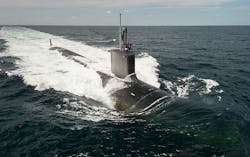Lockheed Martin to tackle upgrading submarine sonar digital signal processing
Officials of the Naval Sea Systems Command in Washington are asking the Lockheed Martin Rotary and Mission Systems segment in Manassas, Va., for work involving the Acoustics-Rapid COTS Insertion (A-RCI) technical insertion (TI) 16 program.
The Navy's A-RCI initiative for two decades has capitalized on commercial off-the-shelf (COTS) ruggedized server and other advanced COTS embedded computing technology for periodic enhancements to the sonar signal processing capabilities to U.S. fast-attack, ballistic missile, and cruise-missile submarines.
The A-RCI TI-16 program provides significant improvements in acoustic performance by upgrading submarine sensor processing, Navy officials say. A-RCI is a sonar system that integrates and improves towed array, hull array, sphere array, and other submarine sensor processing through rapid insertion of COTS hardware and software. Friday's A-RCI TI-16 order to Lockheed Martin includes computer systems, spare parts, and pre-cable kits.
Related: What is the U.S. Navy Acoustics-Rapid COTS Insertion (A-RCI) program?
The company also provides rugged and small-form-factor 1U data storage that operates in temperatures from -2 to 55 degrees Celsius with the ability to withstand shock more powerful than 30 Gs. These computers have connectors conformal coated to protect against salt fog and moisture.
Germane also provides rugged COTS and custom-designed ATR avionics embedded computing for helicopters and fixed-wing aircraft. The company also provides custom-built hyperconverged servers in configurations for mobile cloud servers and high-performance data computing.
A-RCI TI 16 seeks to provide vast improvements in acoustic sensing aboard U.S. fast-attack, cruise-missile, and ballistic-missile submarines without changing the sonar transducer sensors through the rapid insertion of commercial off-the-shelf (COTS)-based digital signal processing hardware and software.
On this order Lockheed Martin will do the work in Manassas, Va., and Clearwater, Fla., and should be finished by December 2022. For more information contact Lockheed Martin Rotary and Mission Systems online at www.lockheedmartin.com/us/rms.html, Germane Systems at www.germane.com, or Naval Sea Systems Command at www.navsea.navy.mil.
Learn more: search the Aerospace & Defense Buyer's Guide for companies, new products, press releases, and videos

